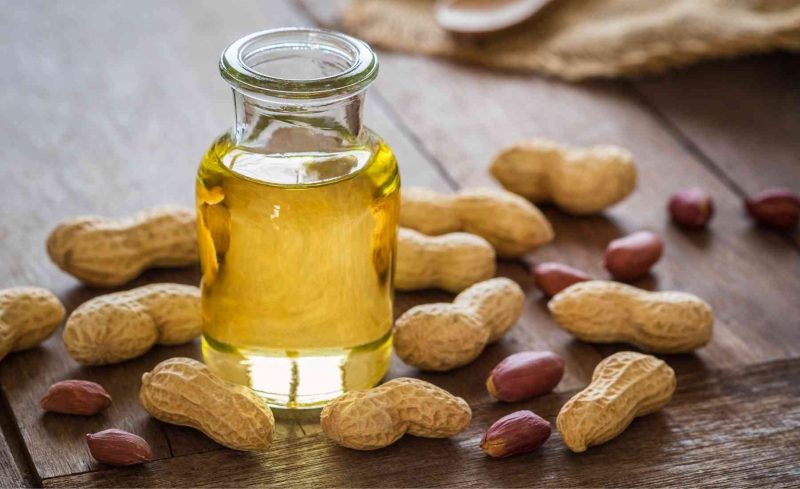Are you looking to substitute peanut oil? Perhaps you have an allergy to peanuts, or you need to take them out of your diet for other reasons. Whatever the case may be, finding a suitable peanut oil substitute doesn’t have to be difficult.
We’ve put together a comprehensive guide to assist you in just that. Here, you’ll discover the best substitutes for peanut oil, as well as other facts about the popular ingredient.
What Is Peanut Oil
Peanut oil, sometimes called Arachis oil or groundnut oil, is an oil derived from vegetables. We get this oil from the edible seeds – peanuts – that come from the peanut plant.
While the flower of these plants grows above the ground, the peanuts develop underground. This is why peanuts are sometimes called groundnuts. What’s more, although peanuts are commonly grouped together with tree nuts like almonds and walnuts, they’re actually a legume in the same category as beans and peas.
It’s also interesting to point out that this oil has a wide-ranging taste that is dependent on how it is processed. For example, it can have a strong and nutty flavor or one that is mild and sweet.
Several types of peanut oil exist, with each one created differently. Let’s take a moment to explore each of these types and discuss how they are made.
Refined
Refined peanut oil is refined, deodorized, and bleached in order to remove the allergenic properties of the oil. As such, people with allergies to peanuts can usually consume refined oil safely. Restaurants typically fry their foods in refined oil.
Cold-Pressed
The method of processing cold-crushed peanut oil is just like it sounds. Peanuts are crushed in low heat to force the oil out of the seed. And yet, because there is no heat applied, much of the peanut’s natural flavor is retained.
What’s more, cold-pressed processing allows for more nutrients to remain intact compared to refining, making this a great choice for consumers who are looking for healthy ways to get essential nutrients.
Gourmet
As a specialty oil, gourmet peanut oil is unrefined and often roasted, which helps to give the oil a much richer and robust flavor. Gourmet peanut oil is noticeably stronger than refined peanut oil, making this the ideal oil for food that needs a nuttier flavor, such as stir-fry.
Blends
If you’re trying to find a budget-friendly peanut oil and don’t necessarily need a gourmet taste, more nutrients, or allergen-free blend, blends are an excellent option. As its name implies, peanut oil blends are blended with other, less expensive oil, such as soybean oil.
Given its affordable price, peanut oil blends are usually sold in bulk for the purpose of frying a lot of food on the cheap.
Although we use peanut oil here in the United States for select dishes, it is most popular in Chinese and Asian cooking. The primary reason that this oil became so popular in the States is due to the food shortages caused by World War II.
Once peanut oil did catch on, people were quick to find how useful it truly is. Thanks to a high smoke point of 437°F, peanut oil is superb at frying up foods like French fries and chicken.
Best Peanut Oil Substitutes
And now we get to the meat of our journey. You’re here to find out which substitute for peanut oil is most suitable for your needs, and that’s precisely what we have prepared for you. Below are the most commonly used alternatives to peanut oil.
Whatever your reasoning is for not taking peanut oil, you’re sure to find a worthy replacement in our list below.
Canola Oil
Canola oil is an excellent option for frying foods. On top of that, canola oil has the ability to withstand high temperatures. If you’re concerned about potential health risks, you’ll be pleased to learn that canola oil has monounsaturated fats and omega-3 fatty acids, which play a role in aiding chronic diseases.
Almond Oil
Yes, almond oil is more expensive than peanut oil by a considerable margin. However, almond oil is decidedly healthier compared to peanut oil. If you have an allergy to peanuts or you’re trying to improve your health, almond oil deserves your attention.
Chefs and cooks rave about almond oil for its culinary benefits. You can find almond oil in two different varieties: cold-pressed and refined. The former is ideal for dressings on salads, while the latter is great for frying.
If you are looking for ways to lower cholesterol, almond oil is a great place to start. This is because it contains monounsaturated and polyunsaturated fats. But that’s not all. You’re also treated to vitamin E and omega-3 fatty acids.
And while there is some belief that almond oil can improve skin health, more research is needed to be certain.

Sunflower Oil
Sunflower oil is a healthy substitute for peanut oil that may serve you well in your mission to improve your quality of life. As with canola oil, sunflower oil contains high amounts of monounsaturated fats, along with omega-6 fatty acids and Vitamin E.
What’s more, sunflower oil has a smoke point of 450°F, allowing for deep frying and regular frying. Some people use sunflower oil as a healthy substitute for baking with butter. Just be aware that sunflower oil is nut-derived. As such, you’ll be exposed to potential allergic reactions if you can’t consume nuts.
Grapeseed Oil
A lot of people love grapeseed oil for its particularly bland taste. Because of this quality, you can freely use it in many dishes without fear of causing your food to taste different. You can fry with grapeseed oil, sear, or saute, making it a versatile substitute for peanut oil.
Studies have also found that grapeseed oil works to lower cholesterol and improve heart health. The only real drawback is that grapeseed oil is pretty expensive. If you’re looking to substitute peanut oil on the cheap, it’s best to look elsewhere.
Safflower Oil
Not to be confused with SUNflower oil, SAFflower oil exhibits many of the same properties found in its brethren. Like sunflower oil, you’re getting a high smoke point when you choose safflower oil. As such, it’s ideal for high-heat cooking.
But you can saute and sear with safflower oil, as well, due to its minimal flavors. There is little to no aftertaste in your foods, making safflower oil more versatile than some of the other peanut oil substitute options.
In addition, you get lots of omega-6 fatty acids, which serve to aid in improved heart health.
Walnut Oil
Walnut oil isn’t necessarily a good substitute for peanut oil, as it is generally used as a dressing rather than a cooking oil. Not only that, but walnut oil is expensive compared to other options. That said, walnut oil does have its share of benefits, thanks to antioxidants and essential fatty acids.
Vegetable Oil
Just about everyone is familiar with vegetable oil. It’s cheap and available in every grocery. That said, it can also be rather unhealthy. So you’ll need to make sure that you check the label to see what kind of nutritional content it has. You want to avoid too many saturated fats.
Is Peanut Oil Healthy?
Yes. Peanut oil happens to be one of the healthiest of all cooking oils. It’s a vegetable oil that is not only trans-fat-free but it’s also cholesterol-free and low in saturated fats. What’s more, this oil has a high unsaturated fat content, specifically monounsaturated fat.
Peanut oil is also a good source for antioxidant vitamin E and phytosterols, both of which serve to benefit heart health. If you’re trying to tighten the reins on your diet and opt for healthier alternatives, this oil is an excellent cooking option.
Nutritional Information on Peanut Oil
The health benefits of peanut oil on heart health and blood lipids were observed in a controlled human study by Penn State University. In the study, subjects were assigned to one of five diets:
- Moderate-fat – 1/2 fat from peanuts and peanut butter
- Moderate-fat – 1/2 fat from peanut oil
- Moderate-fat – 1/2 fat from olive oil
- Average American diet
- Low-fat Step II diet
The peanut oil and peanut and peanut butter diets were shown to improve total and bad LDL cholesterol levels, much like the effects of olive oil. The improvements were significant compared to an average American diet.
Additionally, the risk of cardiovascular disease was also reduced significantly by the peanut oil and peanut and peanut butter diets, much like that of a diet using olive oil.
Another study measured weight loss in people, comparing the effects of moderate-fat and low-fat diets. Peanut oil was used as a substitute for half of the fat content in the moderate-fat diet. Subjects eating a diet using this oil were found to experience improved weight loss and better triglyceride and cholesterol levels.

Health Benefits by Type of Peanut Oil
But what about the different kinds of peanut oil? Do their benefits differ based on the processing method used? We explored this question in detail. Here are our findings.
Refined
As with all processed vegetable oil, refined peanut oil is deodorized, refined, and bleached. In doing so, the components that cause food allergies are removed, thus making it safe for people to eat who suffer from peanut allergies.
Many fast-food restaurants that offer “healthier” foods use refined peanut oil.
Gourmet
Unlike refined peanut oil, gourmet peanut oils aren’t exposed to a refining process. As such, people with peanut allergies should avoid gourmet peanut oil. As a specialty oil, the gourmet variety costs more and is widely used in pricier foods.
However, gourmet peanut oil is rich in vitamin E and phytosterols. The taste is more flavorful, too, making it ideal for recipes that call for such.
100% Oil
You want to make sure that you avoid products that use blended oils. To ensure that you’re getting all of the nutritional value in your oil, check to make sure it is 100% natural. As such, peanut oil should be the only ingredient, not a combination of more than one oil.
Dietary Recommendations
According to US Dietary Guidelines, your recommended fat intake should consist of both monounsaturated fat and polyunsaturated fat, like those found in nuts, seeds, seafood, and oils.
Furthermore, the American Heart Association (AHA) recommends that your fat intake should be good fats, such as monounsaturated fats or polyunsaturated fats.
The best sources for these types of fats are as follows:
- Sunflower oil
- Peanut oil
- Canola oil
- Avocados
- Olive oil
- Seafood
- Seeds
- Nuts
As you can see, there are plenty of healthy food options to turn to for getting good fats in your diet. And with the added health benefits of the many oils, you’ll be well on your way to transforming your diet into one that serves you well.
Discussion on Allergies
It’s important to reiterate that refined oil is not allergenic. The oil is extracted to ensure that any allergy-causing compounds are removed. What’s more, highly refined oil isn’t the same as the peanuts used in gourmet oil due to the fact that it doesn’t contain peanut allergens.
During the refining process of the oil, it is purified, deodorized, refined, and bleached. In doing so, the allergenic proteins are removed. As such, those who are allergic to peanuts can safely consume refined oil without having to worry about allergic reactions.
In an effort to appeal to more consumers and to offer a good substitute for peanut oil, businesses in the foodservice industry will often use peanut oil. Additionally, the FDA doesn’t classify highly refined peanut oil as being a food allergen.
Research has shown that highly refined peanut oil doesn’t cause allergic reactions in people who are severely allergic to peanuts. In fact, a controlled human study conducted by the British Medical Journal found that subjects who are typically allergic to peanuts had no allergic reactions to refined peanut oil and that it didn’t pose a threat.
Therefore, you should be able to safely consume refined oil if you want to change your diet and improve your health. The many health benefits provided by peanut oil can play a significant role in your well-being.
You should certainly consider switching to this oil or a peanut oil substitute if you’re serious about making changes to your diet. Not only do you stand a better chance of weight loss, but also the possibility of preventing various diseases and illnesses.
Looking for more substitutes? Give these posts a read!
Final Thoughts on the Best Peanut Oil Substitutes
You have a lot of different options to consider in your quest for the best substitute. Canola oil, for example, affords you similar cooking possibilities while being a good source of omega-3 and monounsaturated fats.
If you need an oil substitute that offers a similar smoking point, sunflower oil is a good alternative. Plus, it contains plenty of monounsaturated fats, omega-6 fatty acids, and Vitamin E.
Whatever option you ultimately decide, it’s important to remember the potential health benefits that come with your oil of choice. Many of them have preventive properties that can combat heart disease, improve skin health, and fight various illnesses.
Some oils admittedly come with a higher price tag, but that’s often par for the course when investing in a healthy alternative. In the end, you have to consider what you’re spending currently on your diet and the impact that improvements will make.
